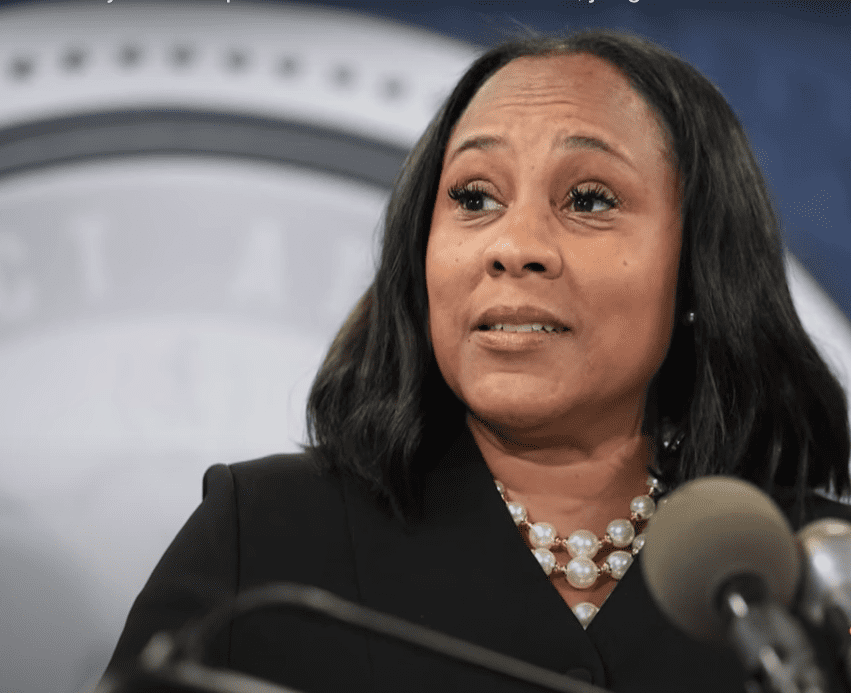Maybe Fani Willis didn’t win after all.
Willis, the Fulton County District Attorney in charge of prosecuting Donald Trump and 14 remaining co-defendants in a 2020 Georgia election interference case, survived an attempt to get her booted when Fulton County Superior Court Judge Scott McAfee ruled in her favor in a 23-page order. The ruling did not spare Willis from the judge’s rebukes concerning her “tremendous” lapses of judgment and unprofessional conduct during the evidentiary hearing in which Trump’s lawyers dredged up salacious details about her romance with former special prosecutor Nathan Wade. The judge further said that there was an “odor of mendacity” about Willis’ testimony — a broad hint that he believes she was untruthful. However, he didn’t dig far enough to prove it.
McAfee last Friday allowed Willis to remain in charge of prosecuting the Georgia election interference case, provided that Wade wasn’t involved because of the “appearance of impropriety” Wade’s involvement created. Wade resigned hours later. That, however, was not enough for Trump’s lawyers, who say that McAfee’s ruling didn’t go far enough to remedy the issues that McAfee himself acknowledged.
Trump lawyer Steve Sadow branded McAfee’s decision to allow the appeal “highly significant” in a statement. “The defense is optimistic that appellate review will lead to the case being dismissed and the DA being disqualified.”
Whether the Georgia Court of Appeals will actually hear the case remains unclear. McAfee authorized a “certificate of immediate review,” which gives the state Court of Appeals 45 days to decide whether to hear Trump’s appeal of McAfee’s after an appeal is filed. The attorneys have 10 days to file the appeal.
Willis, McAfee proceeding as if appeals will fail
If the appeals court declines to hear it, Trump’s team could further appeal to the Georgia Supreme Court. If those appeals were to fail, the case would return to McAfee, who said he would continue working under that assumption by addressing other matters that would get the case ready to be heard.
Willis is working under the same assumption. Previously, she had said she wanted to begin the trial by Aug. 5, but that date seems highly optimistic. Through a spokesman, she said the DA’s office would “work to move it forward to trial as quickly as possible.” The spokesman said her only subsequent comments on the appeal will come through court filings.
An appeal would be in keeping with Trump’s strategy to delay the trial until after the 2024 presidential election in November. While Trump is presumed innocent until proven guilty, the more he stalls, the more public opinion seems to sway against him: A new Politico-Ipsos poll indicates a majority of independent American voters now believe the former president is guilty in a range of criminal cases he is currently facing—not just in Georgia but also in Florida and New York.
But the former president has gained ground. When the case began, he was merely one of several Republicans jockeying for the GOP’s presidential nomination. In the two months that the attention has been deflected onto Willis, Trump has won enough primary votes to sew up the nomination.
Even if Trump were to get what he wants out of Georgia, there is still the matter of the 2020 election interference case brought by special counsel Jack Smith in Washington’s federal court. That case is on hold while Trump’s lawyers have petitioned the Supreme Court to grant the former president “absolute immunity” from criminal prosecution for acts carried out during his term in the Oval Office, which would get the federal election interference case against him dismissed.
Willis is far from Trump’s only concern
There are also two other concerns: the fraud judgment against him in New York, where a New York Supreme Court justice ordered Trump to pay a penalty of almost $355 million, plus interest that continues to accrue at nearly $88,000 a day, and the $88 million judgment against him for defaming author E. Jean Carroll.
He has announced his intentions to appeal both, but to keep them from being enforced, Trump still has to come up with the full amount of the judgment in cash or bonds. While Trump posted a $91.63 million bond in the Carroll case last week, he contacted 30 financial companies for the money in the New York fraud case. None would post it for him due to the risks associated with a large sum. Attorney General Letitia James can begin seizing Trump properties and assets to satisfy the judgment next Monday.













